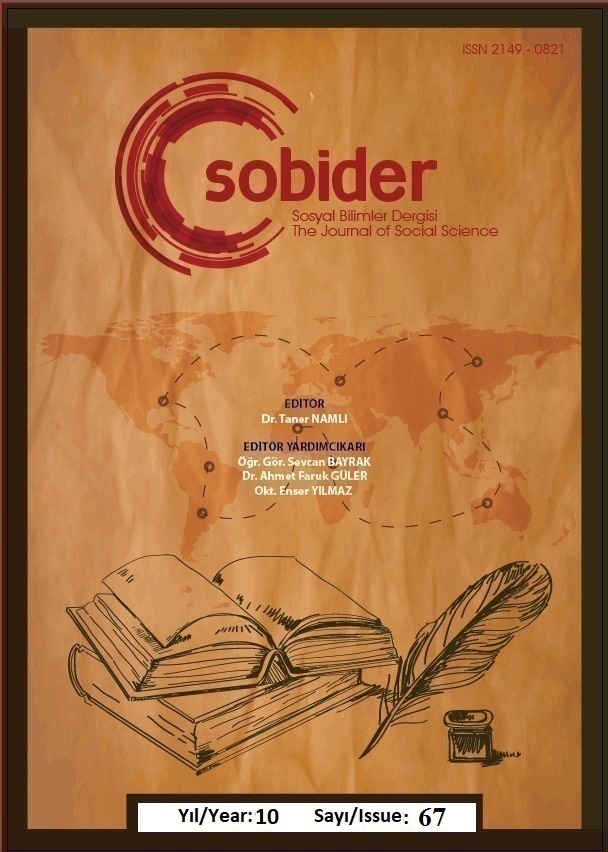Author :
Abstract
Toplumlarda siyaset ve yönetim erken dönemlerinden itibaren vazgeçilmez bir gerçekliktir. Tarihi süreçte sosyal hayatın gündemini ve merkezini oluşturmuştur. Siyaset, yöneten-yönetilen farklılaşmasının organizasyonunu düzenleme sanatı olmuştur. Burada ki kastımız mutlak siyasettir, yani devleti yönetme şeklidir. Bugünkü kısır anlamıyla particilik kastedilmemektedir. Particilik ile siyaset aralarında büyük bir farklılık söz konusudur. Partiler hedefe ulaşmada birer araç iken, siyaset ise amaçtır. Devlet ve siyasal egemenlik açısından yeryüzünde özü itibariyle iki farklı yaklaşım olagelmiştir. İlki insan kaynaklı siyaset ve yönetim sistemleridir. Bugünlerin ifadesiyle batı zihniyetinin ürünü siyasal yapılardır. İkincisi ise, Hz. Peygamberlerin pratiği ile sisteminize ettiği ve izlediği vahiy kaynaklı siyaset yöntemi olarak ifade edilmiştir. Bu konuda Müslümanlar ile batı zihniyetinin siyaset kavramı arasında büyük bir farklılık söz konusudur. Batı zihniyeti diye ifade edilen sistemde siyaset (politika), gücü ve iktidarı elde etmek için kullanılan bir araç olarak görülür. Temel amaç iktidar ve güçtür. İktidara ve güce ulaşmak için bütün yolları mubah gören bir zihniyet mevcuttur. Bu zihniyetin fikir babası, modern siyaset felsefesinin kurucusu kabul edilen İtalyan Rönesans düşünürü Niccolò di Bernardo dei Machiavelli (ö. 1527) olarak ifade edilmiştir. İslam âlimleri ve düşünürleri ise siyaseti sosyal hayatın olmaz ise olmaz yararlı bir faaliyeti, insanlar arasında iyilikleri hâkim kılmanın ve kötülükleri önlemenin bir aracı olarak görmüşlerdir. Peygamberler âdil bir düzen, huzurlu bir toplum inşa etmek için gönderilmiş liderlerdir. Gayeleri dinin muhafazası ve dünya siyasetinin idaresidir. Bu halkanın sonuncusu Hz. Peygamber (sav)’dir. Allah (cc), onunla insanlığın kurtuluş reçetesi olan dinini tamamlamıştır. Vefatının sonrasında onun ideallerini üstlenecek ve siyasi fonksiyonunu yerine getirecek halifeler olagelmiş, süreç içerisinde İslam ulaması siyasal sistemi yapılandırmışlardır. İslam coğrafyasında bu alanda erken dönemlerde pek çok değerli çalışmalar yapılmış ve müstakil eserler ortaya konmuştur. Ancak son dönemler için aynı şeyleri söylemek pek mümkün görülmemektedir. Özellikle son iki üç asırda farklı medeniyet rüzgârlarıyla savrulan ve eksenini kaybeden İslam âleminde çeşitli yapılar ortaya çıkmış, siyaset ve yönetim şekilleri de farklılaşmıştır. Bu çalışmada kelam ilmiyle de alakası olan imamet, devlet ve siyasal egemenlik anlayışının İslâm Hukuku açısından analizi yapılarak değerlendirilecektir.
Keywords
Abstract
Politics and governance is an indispensable reality in societies from the early stages of history. In the historical process, it has formed the agenda and center of social life. Politics has been the art of organizing the differentiation between the ruler and the ruled. What is implied here is absolute politics, that is, the way the state is governed. It does not mean partisanship in today's sterile sense. There is a big difference between partisanship and politics. While parties are a means to an end, politics is the goal. There have been essentially two different approaches to the state and political sovereignty on earth. The first is man-made politics and governance systems. In today's terms, they are political structures that are the product of the western mentality. The second is the revelation-based method of politics that was systematized by his/her holliness and followed by the Prophets through their practice. In this regard, there is a big difference between the concept of politics of Muslims and the western mentality. In the system referred to as the Western mentality, politics (policy) is seen as a tool used to gain power and authority. The main goal is rulership and power. There is a mentality that sees all means as permissible to achieve rulership and power. The father of this mentality was the Italian Renaissance thinker Niccolò di Bernardo dei Machiavelli (b. 1527), who is considered the founder of modern political philosophy. Islamic scholars and thinkers, on the other hand, have seen politics as an indispensable and useful activity of social life, a means of making good prevail among people and preventing evil. Prophets are leaders sent to build a just order, a peaceful society. Their goal is the preservation of religion and the management of world politics. The last of this circle is the Prophet (peace be upon him). With him, Allah (swt) has completed His religion, which is the prescription for the salvation of mankind. After his death, there were caliphs to take on his ideals and fulfill his political function, and the Islamic scholars structured the political system in the process. In the Islamic geography, many valuable studies were carried out in this field in the early periods and detached works were put forward. However, it is not possible to say the same for the recent periods. Especially in the last two or three centuries, various structures have emerged in the Islamic world, which has been blown by different civilizational winds and lost its axis, and the forms of politics and governance have also differentiated. In this study, the understanding of imamate, state and political sovereignty, which is also related to the science of theology, will be analyzed and evaluated in terms of Islamic Law.
